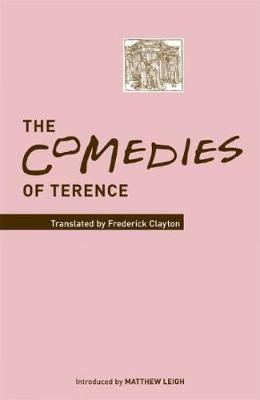Full Product Details
Author: Frederick Clayton ,
Matthew Leigh
Publisher: Liverpool University Press
Imprint: University of Exeter Press
Dimensions:
Width: 14.90cm
, Height: 2.40cm
, Length: 22.90cm
Weight: 0.617kg
ISBN: 9780859897570
ISBN 10: 0859897575
Pages: 320
Publication Date: 27 January 2006
Audience:
Professional and scholarly
,
Professional & Vocational
Format: Hardback
Publisher's Status: Out of Print
Availability: Out of stock

Reviews
Professor T P Wiseman: Fred Clayton was a man in love with literature, and with the English and Latin languages. He was immensely learned, but hopeless at putting together the sort of connected argument that scholarly articles or monographs need, and in any case he wasn't interested in reading what other scholars had written. What he did was read the texts (and teach them, of course); his memory was simply full of them, and he could hear echoes and spot allusions that no-one else had suspected. His translations of Terence's plays, with no attempt at scholarly apparatus, are done in brilliantly deft rhyming couplets with the fluency and elegance you'd expect from someone who had most of the English poets in his head. Matthew Leigh, in his Introduction: The version of Terence presented in this volume renders the Latin comedian in elegant rhyming couplets. Professor Clayton thus achieves two significant ends: first he brings home the fact that Terence, like all the ancient comedians, was indeed a poet; second, he does so in a verse form which has typified English translations and adaptations of ancient comedy...
Clayton keeps up a terrific pace and energy throughout, with varied rhythms and ingenious rhymes. It is translated into an English that is not far from modern speech, but with a dramatic distance imposed by the verse form. Journal of Classics Teaching, 10 ...the likeable introduction by Matthew Leigh... ... the tone is lively and readable. Times Literary Supplement, August 24 & 31 This is a respectable, plain version, which tells you what the Latin is about. But Clayton does more. He reminds us that we can find in Terence an ancestor for English comic verse, ranging from Ralph Roister Doister through Pope to Bernard Shaw and Ogden Nash. Clayton's Demea sounds like a strangely laid-back, Byronic version of Prospero at the end of the Tempest. London Review of Books Fred Clayton was a man in love with literature, and with the English and Latin languages. He was immensely learned, but hopeless at putting together the sort of connected argument that scholarly articles or monographs need, and in any case he wasn't interested in reading what other scholars had written. What he did was read the texts (and teach them, of course); his memory was simply full of them, and he could hear echoes and spot allusions that no-one else had suspected. His translations of Terence's plays, with no attempt at scholarly apparatus, are done in brilliantly deft rhyming couplets with the fluency and elegance you'd expect from someone who had most of the English poets in his head. ...an enjoyable way to get to know one of the founders of European comedy. Journal of Classics Teaching,10 If I had to choose a recent translation of Terence, I would favour Clayton's, in amazingly lively and readable couplets (it also has a good introduction by Matthew Leigh, but no notes or full bibliography). In Clayton's version, the Don Juan-ish rhymes sometimes call the shots and the language is inevitably not much like modern spoken English. But at least he does not let you forget that Terence was a poet, a clear-minded, writerly writer. Sometimes Clayton's Terence actually seems funny, even in our enlightened day and age.
Author Information
Frederick Clayton was Professor of Classics at the University of Exeter. Matthew Leigh, who has written the Introduction to this volume, first became interested in Terence while serving as Lecturer in Classics and Ancient History at the University of Exeter. He is currently Fellow and Tutor in Classics at St Anne’s College, Oxford. He is author of Lucan: Spectacle and Engagement (Oxford, 1997) and Comedy and the Rise of Rome (Oxford, 2004).



